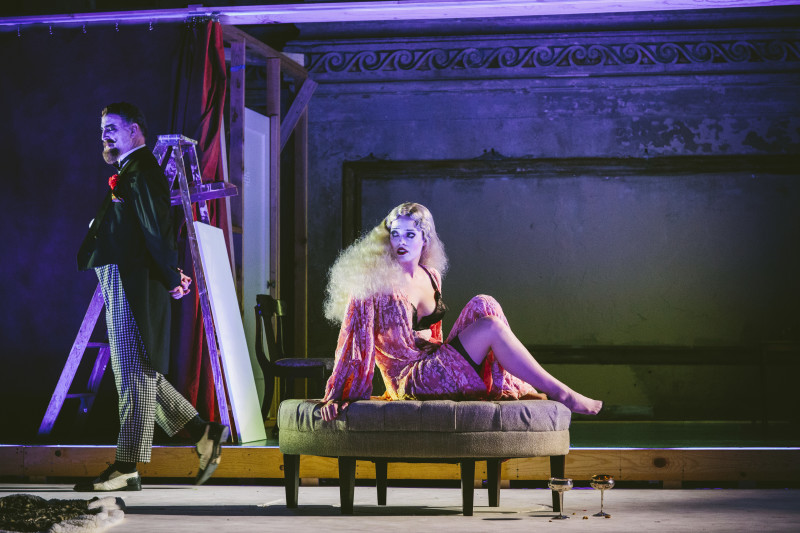The set is spare. There is one main room and two smaller ones upstage, with pink curtains to change some of the scenes. Titles projected above the stage do much of the work of letting us know when and where we are. Adding to the overall sense of economy is a black and white film that condenses the narrative such that some of the music can be cut. This keeps the length of the opera to under three hours.
The space looks cavernous, yet the singing still projects well. In the role of Lulu, Emma McNairy has clearly come into her own. Her commitment to the character is unequivocal and her sound is agile despite how easily those piercing high notes could have rung shrill or hollow.
Presented in a new reduced orchestration, Berg’s atonal music is challenging and the melodic lines are not always obvious. Music Director Jonathan Khuner leads a boisterous orchestra seated on the same level as the audience.
No less captivating is the second opera in the festival, the West Coast premiere of Laura Kaminsky’s As One. Held at the Oakland Metro, the home of erstwhile Oakland Opera Theater, this chamber opera requires the minimalistic forces of just two singers and a string quartet.
Based on the life of transgender filmmaker Kimberly Reed, the opera’s two singers play one character that comes to be named Hannah. We follow her from adolescence to young adulthood. A film by Reed, whose work has been shown at the Telluride Film Festival, also appears during the opera.
Artistic Director Mark Streshinsky’s staging makes efficient use of the space. The Oakland Metro is intimately appropriate for a work of this scale. But there is little air and so the venue becomes uncomfortably warm. The discomfort of audience parallels the distress of the main character.
The stage employs nine platforms arranged around the string players and conductor — The Friction string quartet and Bryan Nies — who sit in the center of the proceedings. This leaves mezzo-soprano Brenda Patterson (Hannah After) and baritone Dan Kempson (Hannah Before) to gamely hop about the platforms around the strident playing. The warm voices temper the strings, though both singers can fill the whole room.
Ten actors fill out the scenes and aid set changes, as does the film displayed on five upstage screens. The addition of video content can be overwhelming, as the voices alone are potent without the imagery. The immediacy of this in close quarters holds the attention.
The tightly-wrought piece lasts a mere 80 minutes. The composer and librettists strike a good balance: the opera is serious, but there are humorous moments throughout. The protagonist is very human without being overly sentimentalized.
The final opera of the festival, Monteverdi’s Il ritorno d’Ulisse in Patria, opens at American Steel Studios in Oakland this coming Saturday. Held in a former pipe factory, this Baroque work based on Homer’s Odyssey will be performed in collaboration with MusicSources, a non-profit devoted to historically informed performances.
The gritty industrial space seems like it might be at odds with a 17th century piece. Given director Streshinsky’s previous unconventional Baroque productions, such as a comedic Xerxes in 2010, he will embrace the contrasts.


